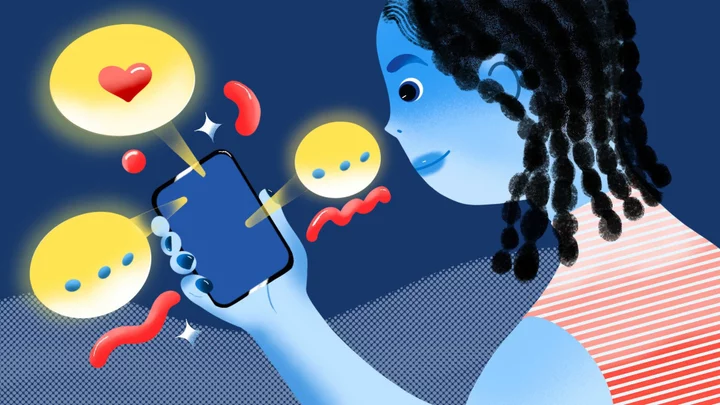
Sennheiser Momentum earbuds are 46% off at Amazon if you hurry
Save $130: As of August 17, the Sennheiser Momentum True Wireless 3 earbuds are on
2023-08-17 22:50

Here's why a smart lock should be the first smart home device you own
Shop Prime Day deals: Amazon smart lock deals Walmart smart lock deals Best Buy smart
2023-10-09 23:57

Cathay Expects to Suspend Hong Kong Flights as Typhoon Nears
Cathay Pacific Airways Ltd. expects to suspend flights starting Friday afternoon through Saturday morning in Hong Kong as
2023-08-31 15:59

Twitter alternative SPILL takes off online
With more limits and money-based restrictions than ever, Twitter isn't doing much to reassure users
2023-07-04 23:15

Ryanair eyes Ukraine tourism after Russia’s war ends
Ryanair’s boss has pledged to “charge back into Ukraine” once commercial flying reopens and promised investment worth $3bn (£2.3bn) in the wartorn country. Michael O’Leary visited Kyiv on Thursday and said that he soon hoped to reconnect the country’s Lviv and Odesa airports with more than 20 European Union capital cities within eight weeks of the reopening of air space with around 600 weekly flights. “The fastest way to rebuild and restore the Ukrainian economy will be with low-fare air travel,” the chief executive said. “Ryanair intends to invest heavily in Ukraine and lead this aviation recovery by investing up to $3bn and basing up to 30 Boeing Max aircraft at Ukraine’s three main airports in Kyiv, Lviv and Odesa. “Having previously also served Kharkiv and Kherson airports prior to the invasion, Ryanair will return to serving those airports too, as soon as the infrastructure has been restored.” He added that the company will employ hundreds of Ukrainian pilots, cabin crew and IT professionals, and we will look to create thousands of new jobs in aviation for Ukrainian citizens. It is hard to say when commercial flights will be possible to and from Ukraine with restrictions still in place due to the ongoing war with Russia. Ryanair held meetings in Kyiv’s Boryspil International Airport with representatives from Ukraine’s main airports, Kyiv, Lviv and Odesa. Mr O’Leary was joined by Boryspil airport chief executive Oleksiy Dubrevskyy and Ukraine’s communities minister Oleksandr Kubrakov. The latter man said the resumption of flights will be possible “as soon as the security situation allows”. “We are already working on solutions and investment plans to enable aircraft to fly up quickly,” he said. Ryanair noted the “excellent state” of the airport infrastructure after examining terminals, baggage claims and passenger check-ins. The company has said that in the first 12 months after the war, more than 5 million seats to and from Ukraine will be on offer with 10 million per year within five years. Read More Russia-Ukraine war – live: Moscow restricts movement of British diplomats over support for Kyiv UK donated 184,000 more artillery shells to Ukraine than planned, says Wallace Ukraine and Pakistan call for restoring the Black Sea grain deal after talks in Islamabad The Body in the Woods | An Independent TV Original Documentary The harrowing discovery at centre of The Independent’s new documentary
2023-07-21 00:21

Cardi B shares her theory on aliens while eating 'Hot Ones' spicy wings
Cardi B's Hot Ones episodes starts off fairly calm, but don't let that fool you.
2023-09-29 18:21

'Quordle' today: Here are the answers and hints for July 13
If Quordle is a little too challenging today, you've come to the right place for
2023-07-13 07:50

Bruce Willis’ family honours him with first Father’s Day tributes since announcing his dementia diagnosis
Bruce Willis’ family shared sweet tributes to the actor on Sunday, which marked his Father’s Day since his frontotemporal dementia diagnosis (FTD) was announced. On Sunday, the actor’s wife, Emma Heming Willis, took to Instagram to share a photo of Bruce with their eldest daughter, Mabel, 11. The pair, who’ve been married since 2009, also share a nine-year-old daughter, Evelyn. In the caption, Emma went on to praise Bruce for the lessons that he’s continued to teach their daughters amid his ongoing health condition. The actor’s family first announced that he had aphasia in March 2022, before revealing in February that his brain condition had developed to FTD. “Father’s Day is a time I get to reflect on my deep appreciation and respect I have for Bruce as I watch him father our little ones,” Emma wrote in her post. “Where it might not be ‘conventional,’ what he’s teaching them will span generations. Unconditional love, kindness, strength, compassion, patience, generosity, resilience.” Emma, who’s been very vocal about her husband’s dementia, concluded her post by emphasising how grateful her entire family is for Bruce. “Happy Father’s Day to the greatest dad I know, who will forever be the gift that keeps giving within our family,” she wrote. Bruce’s ex-wife, Demi Moore, also shared a throwback photo of their family, in honour of Father’s Day on Sunday. In the black-and-white image posted to Instagram, the Die Hard star posed with his and his ex’s three children, Rumer, 34, Scout, 31, and Tallulah, 29. “Forever grateful to you BW for giving me these three beautiful girls,” Moore wrote. “We love our #girldad. Happy Father’s Day!” Meanwhile, Bruce’s oldest daughter, Rumer, took to Instagram over the weekend to express her gratitude for her father. Her post also included a picture of the actor holding his newborn granddaughter, Louetta. “Seeing my father hold my daughter today was something I will treasure for the rest of my life. His sweetness and love for her was so pure and beautiful,” Rumer wrote. “Papa I’m so lucky to have you and so is Lou. Thank you for being the silliest, most loving, coolest Daddio a girl could ask for. Best Girl Dad in the game.” She concluded her caption by wishing a happy first Father’s Day to her partner and father of her child, Derek Richard Thomas. In addition, Scout Willis shared two photos of her and her father on Instagram, along with a heartfelt tribute. After “sending the blessing of this love” to her followers, she reflected on some of the things that she’s learned from Bruce. “I feel so lucky to know the kind of tenderness that this man shares, the deep admiration, respect and reverence he has for his family. I feel so lucky that this incredible, vibrant, man is my father,” she wrote. Scout concluded: “Thinking of everyone for whom today has been challenging and I am loving you with the deepest depths of my heart! What patience, compassion and presence we learn through the greatest challenges in our lives.” Bruce’s family first announced his FTD diagnosis in February, one year after they revealed that he’d been diagnosed with aphasia. In the joint statement, his family spoke candidly about his symptoms and detailed how his condition progressed to FTD. “Unfortunately, challenges with communication are just one symptom of the disease Bruce faces. While this is painful, it is a relief to finally have a clear diagnosis,” they wrote in the statement, shared with the Association for Frontotemporal Degeneration. “Today there are no treatments for the disease, a reality that we hope can change in the years ahead. As Bruce’s condition advances, we hope that any media attention can be focused on shining a light on this disease that needs far more awareness and research.” Along with celebrating Father’s Day on 18 June, Emma also celebrated her 45th birthday. While sharing a few family photos in honour of the occasion on Instagram, she also used her birthday post to send a message about caregiving. “I’m making a few BIG birthday wishes! This one I hope you could make a reality,” she wrote. “Text or call a person in your life that’s a caregiver and let them know here is X, Y, or Z I can do to help you this week.” She noted that even if this person responds to the message by saying they’re “fine” and “don’t need anything,” there are still other ways to show caregivers you’re thinking of them. “Drop some food at their doorstep or flowers or a small something and text them after to let them know it’s there,” Emma concluded. “Or honestly, just tell them thank you and that they are doing a great job. That kindness and support will go such a long long way.” Read More Bruce Willis’ daughter Tallulah speaks out about his early signs of dementia before announcing diagnosis Bruce Willis’ wife Emma shares sweet family photos as she gives update on dementia research work Bruce Willis’s wife Emma credits their nine-year-old daughter with important health advice Tallulah Willis says Demi Moore’s romance with Ashton Kutcher was ‘really hard’ Adele opens up about fungal skin infection after ‘sitting in my own sweat’ Gavin Rossdale says he and Gwen Stefani have ‘opposing views’ as parents
2023-06-20 04:16

How to watch Manchester United vs. Galatasaray online for free
TL;DR: Watch Manchester United vs. Galatasaray for free on RTÉ Player. Access this free streaming
2023-10-03 23:15

Greg Rutherford rushed to hospital after mystery allergy left him ‘screaming and clawing at his skin’
Greg Rutherford’s fiancée Susie Verrill has shared that she had to rush the British track and field athlete to the hospital on Saturday (5 August) after an unknown illness left him “clawing at his skin and just screaming”. Verrill, a social media influencer and blogger, posted about the incident on her Instagram page on Monday morning (7 August) and described it as the “scariest time” of her life. Alongside a photograph of Rutherford, 36, sitting up in a hospital bed and appearing to grimace, she explained that the day began normally and that she went to their friend’s house for a roast dinner with their three children. Verrill said she later received a text message from Rutherford informing her that he might be having “an allergic reaction to something and felt itchy”, but she did not think it was an emergency. However, he called shortly after “screaming” on the phone, she wrote, adding: “And I mean SCREAMING. He shouted, ‘YOU NEED TO GET HERE NOW’ and so I drove back to our house while calling an ambulance, terrified I was about to get home and find him not breathing.” The blogger said she was told that an ambulance would take 40 minutes. Once home, she “ran into the house” and found Rutherford inside, “screaming” and “acting like one of those people you see in videos where they’ve taken bath salts”. “He was clawing at his skin and just screaming. Repeatedly. He ran to our car and while I rang 999 again to say I’d have to take him, we had to run every red light and I had to focus on not crashing while he screamed and tried to grab the wheel,” she recalled. “He was delirious and I looked like I was kidnapping him. I was on the phone to the 999 call handler and the poor girl just kept saying, ‘OK yeah he doesn’t sound good, please be safe but hurry’ and I was like OK well this is a nightmare because I’ve been driving like three months. It was AWFUL.” She continued her story in another slide, which showed a close-up of Rutherford’s skin on his thighs. It appeared red with raised bumps, like hives or a rash, covering the surface. Verrill said she “threw [Rutherford] out” of the car in front of the A&E and went to park her car. Once inside the hospital, she was told that staff had sent him to “Resus”, which is a term used for the resuscitation area of the department. “I think [they sent him there] mainly because he was a six-foot-three bloke acting like a psychopath and they didn’t want to scare anyone,” she wrote, adding: “They also pumped him full of steroids and antihistamines and it seemed to work pretty much immediately. Thankfully by the time I got there he’d stopped screaming and raking himself.” In the next slide, she showed Rutherford still sitting up in a hospital bed, but appearing calmer. She said that they were allowed to leave the hospital three hours after they arrived. Verrill added that she “felt close to having a heart attack” but reassured followers that she was fine otherwise. “My question is – we did nothing differently yesterday in terms of eating/drinking but the only snack Greg ate was nuts – could he have developed an allergy, do we think?” she asked her fans. “Have any of you had this? Hospital recommended we get him tested but said it could have also been viral. I appreciate rashes can appear with a viral illness but his body went MAD. The doctor who suggested the viral thing hadn’t seen how Greg had been on arrival; I can’t explain how much pain he was in.” She recalled a time when Rutherford “shrugged off a grumbling appendix” in comparison to how he reacted to the recent illness, and asked followers to let her know if they had ever experienced something similar. In her most recent Instagram Story, Verrill addressed suggestions from fans that Rutherford may have come into contact with a plant on his run that may have caused the reaction. “We don’t think it was any sort of plant because the reaction began before he went on his run (although we appreciate this may have exacerbated symptoms with the sweating),” she wrote. “Greg’s having some tests this morning so hopefully it can start the ball rolling and if I don’t get back to you just yet, I’m so sorry. I’ve had about 500 messages already! Really, really appreciate all the advice.” Rutherford, who participated in Strictly Come Dancing in 2016, also shared Instagram Stories about his experience. In one slide, showing a close-up of his skin from another angle, he wrote: “I suddenly had a massive allergic reaction to something (no idea what) and had to get Susie to rush me to hospital. Thankfully they pumped me with a load of stuff and calmed it down. But it was HORRIBLE. This rash was covering my entire body.” In a second Story, he shared a photograph of himself and added: “I’m not home. A little [itchy] still, but nothing like earlier. I was trying to get my skin off it was so bad. I’m going to get some tests done to figure out what it was, as I NEVER want to experience that again.” The sportsman thanked the hospital staff for helping him, adding: “I was screaming at one point… So apologies for that too.” Rutherford and Verrill have been together since 2012 and share a daughter named Daphne, two, and sons Milo and Rex, eight and five respectively. The couple were due to be married in May, but postponed their wedding because of the death of a family member. Read More Marina O’Loughlin is wrong – there’s joy in solo dining Jamie Foxx and Jennifer Aniston issue statements over ‘antisemitic’ Instagram post Will Smith says daughter Willow’s ‘mutiny’ changed his view on success What is Lyme disease? Bella Hadid reveals ’15 years of invisible suffering’ Study reveals how muscle cells deteriorate with age, hampering injury recovery Bella Hadid looks back on ‘15 years of invisible suffering’ with Lyme disease
2023-08-07 22:16

How to report a tweet for deadnaming or misgendering someone
If you're on Twitter and see a person deadnaming or misgendering someone else, you should
2023-06-14 19:28

Joe Rogan: Meet controversial podcaster's parents Susan Lembo and Joseph Rogan Sr
Joe Rogan's parents split up when he was little and the podcaster has often alleged that Rogan Sr abused him as a child
2023-06-25 21:28
You Might Like...

War-traumatized Ukrainian bear to be adopted by Scottish zoo

Lance Stroll crashes into barrier at 110mph in Singapore Grand Prix qualifying

Mercedes adds ChatGPT to its cars to make them chattier

TikTok is shutting down its Creator Fund

FIA chief denies sexism accusations and claims he faced ‘inhuman’ smear campaign

TikTok finally lets creators cash in on their viral effects

Donald Trump has been indicted again, and he's mad about it

UnCruise Adventures’ Summer Flash Cruise Sales Will Save Guests Thousands in Airfare Credits
